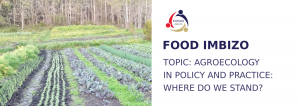Time: 10:00 - 12:30
Venue: Zoom

In the Food Systems Profile – South Africa: Catalysing the sustainable and inclusive transformation of food systems, coordinated by the DSI-NRF Centre of Excellence in Food Security (CoE-FS), a paradox was noted: hunger and malnutrition persist despite comparatively high GDP, a diversified economy and a sophisticated food and nutrition security policy environment. Moreover, the early adoption of currently dominant industrial agriculture has led to the degradation of an already vulnerable natural environment. This has been aggravated by climate change and growing asymmetries in power, efficiencies, and information across food value chains and spheres of governance.
Among the options to address these challenges, the report proposes that support is needed to promote a transition towards agroecological food systems. Agroecology is simultaneously a method of production rooted in natural and ecological processes, a people’s science validating traditional knowledge and integrating this with ecological science, and a social movement promoting more equitable participation and agency in the governance of food systems.
Under the banner of TAFS (Transitions to Agroecological Food Systems), the CoE-FS, in partnership with the French Agricultural Research Centre for International Development (CIRAD) and the Southern Africa Food Lab, has conducted research on the current policy environment and trends shaping agroecology in South Africa. The first phase of the research has led to a detailed report of the stakeholders, discourses and policies informing transitions to agroecology in South Africa. The second phase of the programme investigated the reality of agroecological practices in three places: Overberg in the Western Cape, eThekwini in KwaZulu-Natal, and Umzimvubu in the Eastern Cape. The results are presented in a forthcoming synthesis report titled Agroecological initiatives in South Africa.
To inform policy and civil society in this space, the programme’s team has now developed two draft policy briefs which outline the key findings and explore what such a transition would entail. Following a first Food Imbizo on agroecology held in November 2021, the CoE-FS is now convening an interactive multi-stakeholder workshop comprising officials, academics, activists and food industry representatives to share the findings and facilitate discussion. Documentation will be shared with registered participants to inform discussions.
We want to invite you to participate in this workshop, for which the details are as follows:
When: Tuesday, 6 December, 10:00 – 12:30
Where: Zoom – register here
Upcoming Events
Our GOALS
We recognise that producers, processors, distributors and consumers are incorporated into the food system under varying terms and returns. We also recognise the economic, social, human and environmental health impacts associated with food security. Therefore our goal is to conduct research, build capacity and disseminate findings that will promote a sustainable food system in South Africa.
Our MISSION
Our research is concerned with the scale, nature, causes and consequences of food insecurity in South Africa and elsewhere on the African continent. Thus our mission is to investigate products, technologies, processes and policies that can reduce food insecurity and mitigate its negative outcomes. We seek to make a difference to food security by linking innovative science with critical enquiry.



